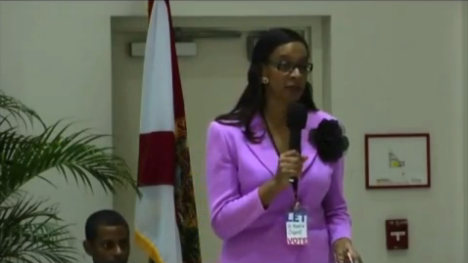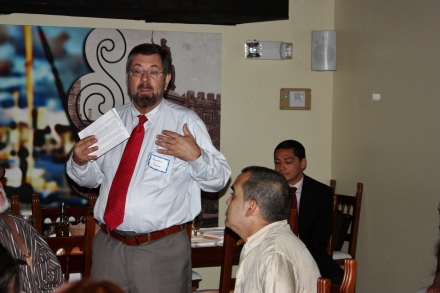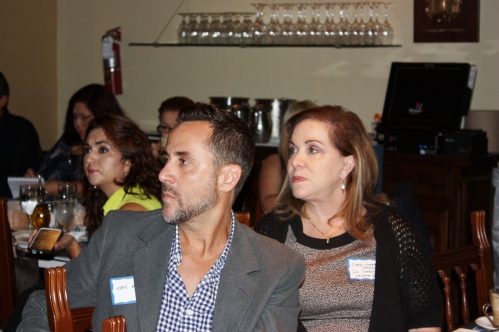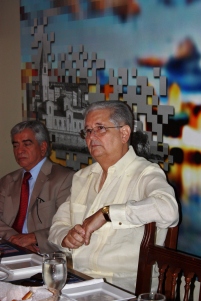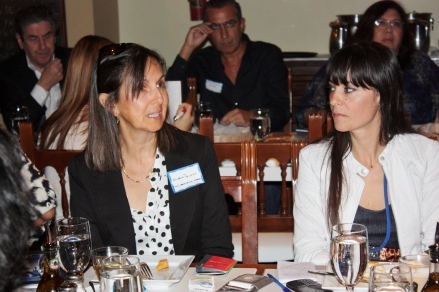By Brian Pacheco, GLAAD’s Spanish-Language Media Strategist
-Disponible debajo en español-
Last week, GLAAD’s Director of Spanish-Language Media, Monica Trasandes, Carolina González, Public Information Officer for ACLU of Florida, and I facilitated a webinar about LGBT issues for local South Florida advocates and community members, who took the opportunity to ask important questions. The result? Dozens became more informed about LGBT issues, and were now equipped to share the information they learned with their peers and loved ones. Working with Hispanic and Latino community members around the country is my absolute favorite part of the work that I do. As a Latino, it warms my heart to hear stories of Hispanic/Latino families accepting their lesbian, gay, bisexual and transgender family members, and it breaks my heart to hear stories of rejection. But more and more I hear about beautiful, emotionally moving stories of families coming around and loving and accepting their LGBT family members for who they are. 
Last week’s webinar was only one step that GLAAD and the ACLU of Florida are taking to do just that: advance equality for LGBT people in Hispanic/Latino communities. This is why I am happy to be a part of the ACLU’s South Florida Hispanic Initiative. I get to help LGBT and ally Hispanics have those conversations with their families, friends and members of their communities, to help build respect, support and acceptance for those us in the Hispanic community that are LGBT. In fact, study after study shows that Hispanic support for LGBT people and issues is strong and ever growing: A 2012 Pew Hispanic Center study showed that 59% of Hispanics/Latinos said that homosexuality should be accepted by society. A poll by National Council of la Raza this year showed that 54% of Latinos support marriage between same-sex couples. A 2010 poll by Bendixen & Amandi showed that 80% of Hispanics/Latinos believe that the gay community faces discrimination often; 83% of Latinos support housing and employment non-discrimination policies; 75% of Latinos support school policies to prevent harassment and bullying students who are, or perceived to be, gay.
This is great news. Yet we still have a lot of work to do to educate our Hispanic community about the harm that rejection of LGBT family members causes to entire families. Studies by the Family Acceptance Project has shown that family acceptance and support correlates with better health outcomes for LGBT youth; and conversely, rejection of LGBT family members by their families can lead to depression, and high-risk behaviors, including substance abuse, unsafe sex, suicide, and skipping school due to feeling unsafe. And according to a report by the Center for American Progress, although only 5-7% of all youth is LGBT, they comprise nearly 40% of all homeless youth; and of this, 26% is Hispanic. But we have great reason to be hopeful for a better world, since Hispanic support is already so strong. Hispanic families are stronger when they are together and our—my—Hispanic community is stronger when it is together.This initiative will contribute towards that, so please consider joining us: ACLU-FL GLAAD.
###
Hablando de temas relacionados con personas LGBT en comunidades Hispanas/Latinas
Por Brian Pacheco, Estratega de Medios en Español De la Alianza Gay y Lésbica Contra la Difamación (GLAAD)
La semana pasada, la Directora de medios en español de GLAAD, Monica Trasandes, Carolina González, Oficial de Información Pública de la ACLU de la Florida, y mi persona realizamos un seminario sobre temas LGBT (Lesbianas, Gay, Bisexuales y Transgéneros) dirigido a activistas y miembros de la comunidad del Sur de la Florida, quienes tuvieron la oportunidad de hacer importantes preguntas ¿El Resultado? Decenas de personas fueron informadas sobre los temas relacionados con las personas LGBT y fueron capacitados para compartir información sobre lo que aprendieron con sus conocidos y sus seres queridos. Trabajar con miembros de la comunidad hispana y latina de todo el país es mi parte favorita del trabajo que hago. Como latino, me alegra el corazón poder escuchar las historias de familias hispanas / latinas que aceptan a miembros de su familia lesbianas, gay, bisexuales y transgéneros, y me rompe el corazón escuchar historias de rechazo. Sin embargo, cada vez más oigo hablar sobre historias conmovedoras de familias que apoyan, amar y aceptar a sus relativos LGBT por lo que son.
 El seminario por Internet realizado la semana pasada fue sólo uno de los muchos pasos que GLAAD y la ACLU de la Florida están tomando para hacer precisamente eso: promover la igualdad entre las personas LGBT en las comunidades hispanas / latinas. Por eso estoy feliz de ser parte de la iniciativa hispana de la ACLU de la Florida. Yo vine a ayudar a los hispanos LGBT y aliados hispanos a tener este tipo de conversaciones con sus familiares, amigos y miembros de sus comunidades, para ayudar a fomentar el respeto, el apoyo y la aceptación de los que integramos la comunidad hispana y que son LGBT. De hecho, estudios tras estudios muestran que el apoyo hispano hacia las personas y temas LGBT es cada vez mayor y más fuerte: Un estudio de Pew Hispanic Center, 2012 muestra que 59% de los Hispanos/Latinos dicen que la homosexualidad debería ser aceptada en nuestra sociedad. Una encuesta realizada por National Council of la Raza este año muestra que 54% de los Latinos/Hispanos apoya el matrimonio entre parejas del mismo sexo. Una encuesta realizada en 2010 por Bendixen & Amandi muestra que 80% de los Hispanos/Latinos cree que la comunidad gay enfrenta discriminación frecuente; 83% de los Latinos/Hispanos apoya que se implementen políticas de empleo de no-discriminación; 75% de los Latinos/Hispanos apoya políticas escolares para prevenir el acoso e intimidación a estudiantes que son, o parecen ser gay.
El seminario por Internet realizado la semana pasada fue sólo uno de los muchos pasos que GLAAD y la ACLU de la Florida están tomando para hacer precisamente eso: promover la igualdad entre las personas LGBT en las comunidades hispanas / latinas. Por eso estoy feliz de ser parte de la iniciativa hispana de la ACLU de la Florida. Yo vine a ayudar a los hispanos LGBT y aliados hispanos a tener este tipo de conversaciones con sus familiares, amigos y miembros de sus comunidades, para ayudar a fomentar el respeto, el apoyo y la aceptación de los que integramos la comunidad hispana y que son LGBT. De hecho, estudios tras estudios muestran que el apoyo hispano hacia las personas y temas LGBT es cada vez mayor y más fuerte: Un estudio de Pew Hispanic Center, 2012 muestra que 59% de los Hispanos/Latinos dicen que la homosexualidad debería ser aceptada en nuestra sociedad. Una encuesta realizada por National Council of la Raza este año muestra que 54% de los Latinos/Hispanos apoya el matrimonio entre parejas del mismo sexo. Una encuesta realizada en 2010 por Bendixen & Amandi muestra que 80% de los Hispanos/Latinos cree que la comunidad gay enfrenta discriminación frecuente; 83% de los Latinos/Hispanos apoya que se implementen políticas de empleo de no-discriminación; 75% de los Latinos/Hispanos apoya políticas escolares para prevenir el acoso e intimidación a estudiantes que son, o parecen ser gay.
Esto es una gran noticia. Sin embargo, aún nos queda mucho trabajo por hacer para educar a la comunidad hispana/latina acerca de los daños que el rechazo a familiares LGBT ocasiona a familias enteras. Los estudios realizados por el Proyecto de Aceptación Familiar han mostrado que la aceptación familiar y el apoyo se correlacionan con mejores resultados de salud para jóvenes LGBT, y por el contrario, el rechazo de familiares LGBT puede llevar a la depresión y conductas de alto riesgo, como el abuso de sustancias, prácticas sexuales de riesgo , suicidio, y ausentismo escolar debido a la sensación de inseguridad. Y según un informe del Center for American Progress, aunque sólo el 5-7% de todos los jóvenes pertenece a la comunidad LGBT, ellos comprenden casi el 40% de todos los jóvenes sin hogar, y de éste, el 26% es de origen hispano. Pero tenemos motivos para tener esperanza de un mundo mejor, ya que el apoyo hispano/latino es ya muy fuerte. Las familias hispanas son más fuertes cuando están unidas, nuestra -mi- comunidad hispana es más fuerte cuando está unida. Y esta iniciativa contribuirá a esta unión, así que por favor considere unirse a nosotros: ACLU-FL GLAAD.




